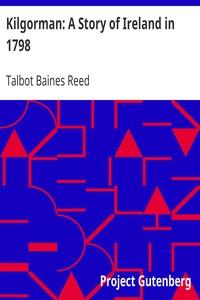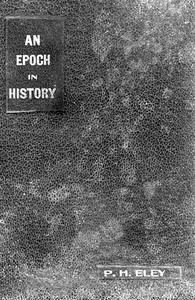|
|
Read this ebook for free! No credit card needed, absolutely nothing to pay.Words: 108487 in 58 pages
This is an ebook sharing website. You can read the uploaded ebooks for free here. No credit cards needed, nothing to pay. If you want to own a digital copy of the ebook, or want to read offline with your favorite ebook-reader, then you can choose to buy and download the ebook.

: Kilgorman: A Story of Ireland in 1798 by Reed Talbot Baines Stacey W S Walter S Illustrator - Ireland Juvenile fiction; France History Revolution 1789-1799 Juvenile fiction@FreeBooksTue 06 Jun, 2023 Illustrator: W.S. Stacey Kilgorman A Story of Ireland in 1798 The time of the story is in the 1790s, during the French Revolution, which we see at close quarters during our hero's time in France. We also visit Rotterdam, in Holland. But most of the action, at least that which takes place on dry land, takes place in Donegal, that long wild part of Ireland that lies to its extreme north-west. There are several lines of the story. One of these is the great love that exists between the hero and his twin brother. Another is the question, Are they brothers? For only one person actually knows, and she is far away: the hint that there is a problem is given in a dying note by the woman that passed as the boys' mother. The third theme is, as always with Ireland, plotting for an uprising against English rule. In this department nothing changes. BY TALBOT BAINES REED Preface, by John Sime IN MEMORIAM. The secret of Reed's success in this direction was that all through life, as every one who had the privilege of knowing him can testify, he possessed in himself the healthy freshness of heart of boyhood. He sympathised with the troubles and joys, he understood the temptations, and fathomed the motives that sway and mould boy-character; he had the power of depicting that side of life with infinite humour and pathos, possible only to one who could place himself sympathetically at the boys' stand-point in life. Hence the wholesomeness of tone and the breezy freshness of his work. His boy-heroes are neither prigs nor milk-sops, but in their strength and weakness they are the stuff which ultimately makes our best citizens and fathers; they are the boys who, later in life, with healthy minds in healthy bodies, have made the British Empire what it is. A special and pathetic interest attaches to this story of "Kilgorman," the last that left Talbot Reed's pen. It was undertaken while he was yet in the prime of his strength and vigour. The illness which ultimately, alas, ended fatally had already laid hold on him ere he had well begun the book. In intervals of ease during his last illness he worked at it, sometimes in bed, sometimes in his armchair: it is pleasant to think that he so enjoyed the work that its production eased and soothed many a weary hour for him, and certainly never was other than a recreation to him. The pen dropped from his hand ere he had quite completed the work, yet, as the book stands here, it is much as he meant to leave it. The figures of Barry Gallagher, and Tim, and the charming Kit will take their places in the delightful gallery of his young people, and their adventures by land and by sea will be followed with an increased interest that they are the last that can come from his brilliant pen. Talbot Reed came of a right good English stock, both on his father's and his mother's side. His grandfather, Dr Andrew Reed, a Nonconformist minister of note in his day, left his mark in some of the soundest philanthropic undertakings of the century. His thoughtfulness and self- sacrificing energy have lightened the sufferings and soothed the old age of many thousands. He was one of the founders of the London, Reedham, and Infant Orphan Asylums, the Earlswood Asylum for Idiots, and the Royal Hospital for Incurables. His son, Sir Charles Reed, and grandsons, have done yeoman service in carrying on to the present day the noble work begun by him. Talbot was the third son of the late Sir Charles Reed, Member of Parliament for Hackney, and latterly for Saint Ives . His mother, Lady Reed, was the youngest daughter of Mr Edward Baines, Member of Parliament for Leeds. She was a lady of saintly life, of infinite gentleness and sweetness of heart, with extraordinary strength and refinement of mind, reverenced and loved by her sons and daughters, and by none more than by Talbot Reed, who bore a strong resemblance to her alike in disposition and in physical appearance. Free books android app tbrJar TBR JAR Read Free books online gutenberg More posts by @FreeBooks
: London and the Kingdom - Volume 2 A History Derived Mainly from the Archives at Guildhall in the Custody of the Corporation of the City of London. by Sharpe Reginald R Reginald Robinson - London (England) History United Kingdom@FreeBooksTue 06 Jun, 2023

: 'A Comedy of Errors' in Seven Acts by Spokeshave - Philippines History 1898-1946 Drama@FreeBooksTue 06 Jun, 2023
|
Terms of Use Stock Market News! © gutenberg.org.in2025 All Rights reserved.






